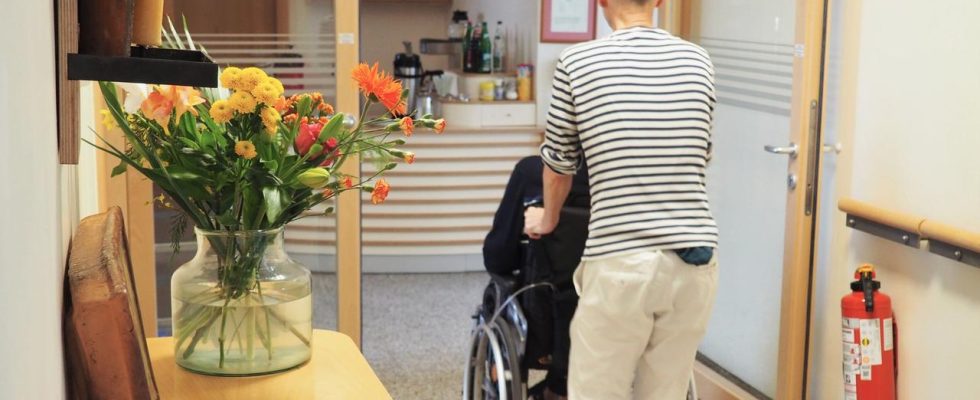There are still too few suitable places for lesbians, gays, bisexuals, transgenders and intersex people. Because in the care industry there is a lack of knowledge about queer lifestyles.
Friedrich Wagey laughs: Although he has “super genes”, he still has his thoughts, he says jokingly. The 69-year-old from Hamburg is still doing well, but one topic worries him: the care of LGBTIQ+.
Because three years ago he lost his partner. After a brain tumor, his husband became in need of care. It was very clear to Wagey: he would rather take care of him at home than give him to a care facility. He didn’t want that, even though the care took him to the limits of his own strength.
It is true that palliative volunteers from his environment supported him. But it was crucial for the support that you can live openly as a gay or queer person and that there is a relationship of trust with the caregiver. “Nurses are under a lot of stress,” says Wagey, who once worked in the nursing field. That is why it is important in normal care operations that gender and culture-sensitive training is also provided.
Few care offers
Queer-sensitive nurses are one thing – the other residents are another. That makes the loneliness even worse. “A spiral of loneliness will then set in motion,” Wagey fears. “If I don’t find a connection with the others, I withdraw – or I adapt and hide.” Older gays, lesbians, transsexuals or intersexuals who had to struggle through an outing are made invisible again in old age.
According to the medical service of the health insurance companies, only three percent of inpatient care facilities currently have specific offers for LGBT people. Thomas Schubert from Hospice Leuchtfeuer in Hamburg is also aware of the enormous demand. As a carer, the 57-year-old accompanies his residents on their last ward in life. He has been working here with short breaks since 1997.
The Hospice Beacon is the first care facility in Hamburg that is involved in the field of “diverse care”. There are eleven places in the facility. Far too little for a big city like Hamburg and a need that is likely to intensify if the baby boomer cohorts get older.
The nurse Thomas Schubert in the hospice beacon
familiar relationship
“I can’t imagine any other profession that encroaches on someone else’s privacy like being a nurse,” Schubert puts it in a nutshell while sorting the medicines for the residents of the home. “I’ll put it bluntly: I wipe other people’s butts. Who thinks it’s good to have their butts wiped by a stranger? What does that do to my counterpart?”
Nursing staff and those in need are in a hierarchical relationship. The autonomy is gone – and the dignity is touched. You need a basis of trust. “But when I, as the other person, have the feeling that there is a nurse standing in front of me who actually rejects me, then it’s unbearable,” says Schubert.
recurring experiences of discrimination
Hospice Beacon is always “about creating an atmosphere”, as they say here. “How do I deal with it, for example, when you’re confronted with someone who may appear to be a man from the outside, but who defines himself as a woman. Or says I can’t clearly identify any gender?” says Schubert .
Other care facilities would also have to deal with such questions much more, because the needs are different. “In old age, the residents often catch up with the experiences of discrimination they have had throughout their lives. They multiply,” says Schubert. It is therefore essential that you are cared for with a view to your own biography.
would a “Seal of quality” help?
This is a challenge for the German care system, which is also struggling with a shortage of skilled workers. Because there is still a lot of ignorance in the care industry. The 69-year-old Wagey would therefore like a certified seal of quality that shows whether employees know how to deal with queer people.
That already exists in Berlin. There, the Berlin gay counseling service awards the certificate “LebenssortDiversity” to nursing homes that actively seek to encourage the participation of queer people. In Frankfurt, good experiences have been made with the “rainbow key”, a concept adopted from the Netherlands. In 2019, the AWO Federal Association also opened individual nursing homes for lesbians, gays, trans and interpersonal people as part of the “Queer in Age” model project and developed a further training concept for nursing staff from the findings.
So far only regional projects
Until recently, there was nothing like that in Hamburg. Only a few weeks ago, the “network LSBTIQplus care and aging” was founded here, which would like to ask itself how to get good living and care conditions for queer people in the Hanseatic city. The associations of statutory nursing care funds support it financially. Wagey also wants to contribute his personal experience to the network.
Wagey hopes that in the future there will be a greater awareness of the needs of queer older people throughout the care industry. Queer people of senior age should become visible.

